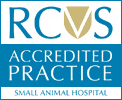
What is chemotherapy and how does it work?
Chemotherapy is the treatment of cancer with drugs. It can be used on its own or in combination with surgery or radiotherapy. All cells divide and multiply, but cancerous cells do this at an uncontrolled and often faster rate. Chemotherapy damages dividing cells, however healthy tissue cells will usually be better at recovering. Chemotherapy, therefore, aims to reduce the cancer burden, thereby improving the animal’s quality of life and lifespan.
How is chemotherapy given?
Some chemotherapy drugs are administered by injection, whilst others are given orally. Injections are often delivered over 10-30 minutes. Tablets are most commonly concealed in food.
What can I expect at chemotherapy clinic?
Chemotherapy out-patient clinics take place every afternoon, Monday to Thursday. Once you have arrived at the clinic, the oncology nurse will take a blood sample from your pet, then the clinician will review the results and assess your pets progress.
You will then have the opportunity to discuss any potential concerns you may have and the treatment plan. Your pet will receive their treatment in the chemotherapy room, which can take between a few minutes to half an hour, depending on the treatment required. You are welcome to help yourself to the refreshments on offer whilst you wait.
General information - safety and handling
Occasionally, your pet may be returned home with a pressure bandage on its leg where the intravenous catheter has been removed. Please remove the bandage within an hour to avoid irritation. Visually check the injection site one or two times a day to ensure the area looks clean. Please call us for advice if the area is swollen, red, or looks abnormal, or if your pet is licking the area excessively.
Traces of chemotherapy are excreted in urine, faeces and in saliva of your pet, and it is important to minimise your exposure to these drugs.
The instructions below should be followed for 7 days after each chemotherapy treatment
- New and expectant mothers and young people (under 18 years) should NOT handle waste from these patients.
- Wear disposable rubber gloves when cleaning up waste i.e. urine and faeces.
- Mop up any “accidents” inside the home with absorbent disposable towels (wearing disposable rubber gloves). Wash the area well with a disposable cloth and detergent, then rinse and dry with more absorbent towel. Put all waste into a sealed bag, which can then be disposed of in the normal household bin.
- Plastic litter tray liners (e.g. Canac litter tray liners) should be used for cats and the entire contents should be discarded once soiled. Disposable rubber gloves should be worn when handling the litter/waste.
- Dogs should ideally be exercised on grassy areas. Any areas of soiling should be watered (after picking up of faeces) either using your own hosepipe or watering can or a bottle of water that is carried with you when exercising away from home.
- If the pet has any incontinence, serious thought should be given to whether chemotherapy should be administered. If urine soiling occurs your pet will require bathing; rubber gloves should be worn. If possible, the bath should take place outside. Rinse thoroughly before drying. Soiled bedding should be washed separate to the household laundry.
Administering oral chemotherapy at home
- Keep the medication in the appropriate packaging provided and do not store in the kitchen or near food. If the medication is required to be refrigerated, please keep it in its packaging and separate from all food and liquids.
- Ensure any other pets and children do not have access to the drugs.
- Do not eat, drink or chew gum when administering the medication.
- Do not crush or break the pills under any circumstances.
- Wear un-powdered latex gloves when handling the medication (unless allergic to latex in which case wear un-powdered non-latex gloves). After administration, dispose of the gloves promptly and wash your hands thoroughly.
- Gloves and empty packaging can be returned to Cave Veterinary Specialists for disposal.
- Gloves, waste bags and incontinence sheets can be obtained from Cave Veterinary Specialists.
Accidental Exposure
Please avoid direct contact with these drugs in all circumstances. Please avoid contact with your pet 72 hours after chemotherapy has been given if you are pregnant, trying to get pregnant or breastfeeding. In the event of accidental exposure, wash skin thoroughly and if your skin becomes irritated contact your doctor. Please phone the practice if you have any cause for concern or are worried about your pet after chemotherapy e.g. if your pet shows any of the following symptoms:
- Vomiting
- Diarrhoea
- Lethargy
- Anorexia
- Collapse
- Difficulty passing urine or faeces
- Any abnormal behaviour
What are the side effects of chemotherapy?
Animals experience overall, less side effects of chemotherapy than humans do as we use lower doses and less intense protocols. Approximately 1 in 5 dogs or cats will experience some side effects such as:
- Nausea, vomiting or diarrhoea - we will provide you with oral anti-nausea drugs, which can be given if your pet is not having a normal appetite. If this lasts more than 24-36 hours or your pet vomits more than 4-6 times in a day, please contact us or your local vet. Please do the same for profuse diarrhoea or if there is a significant blood component in the stools.
- Bone marrow suppression - this means that certain types of white blood cells (infection-fighting cells) or platelet (involved in clotting) numbers are reduced. This could make your pet more susceptible to infection or increase their risk for bleeding. It is possible that your pet may develop a fever and be much quieter, with less interest in food or drink. It is important that you contact either ourselves or your vet for advice as soon as possible.
- Hair loss happens rarely but is more likely in dogs with continually growing hair coats (eg. Poodles, Old English sheepdogs). Cats may lose their whiskers. If chemotherapy is stopped, we would expect the hair to grow back.
How can we prevent side effects?
Before every drug administration, we will take a blood sample and check the blood cell and platelet numbers to make sure chemotherapy can be safely administered that day. We will also send this sample to an external laboratory for validation and to monitor biochemistry values (organ function). Chemotherapy drug administration will be postponed if the cell numbers are inadequate. Injectable anti-nausea drugs can be given at the time of chemotherapy and this can be continued orally at home. We might reduce the future dose of drug if your pet experiences side effects. Please inform us of any concerns, either at the time of the consultation or call us.
What should I do if my pet becomes ill during chemotherapy treatment?
Should your pet become ill, please seek veterinary assistance, either by calling Cave Veterinary Specialists or your local vet for advice. If your pet becomes severely ill, she/he may require hospitalisation and for supportive therapy.



